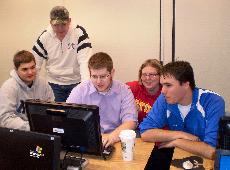Gaming course draws from a mix of majors

November 18, 2009
Students in the new computer science senior colloquium will be pitching their projects–educational video games– to Indianola Schools later this year in hopes of the schools using the games they’ve created.
According to senior Adrian Aitken, the colloquium was created to have students come together to show what they have learned during their time at Simpson College.
“The idea of the colloquium is to bring together different disciplines, people who have studied something for so long, and to bring their skills and knowledge to an actual applicable project,” Aitken said.
Students from many different majors were asked to sign up for the class. Computer science majors worked on the physical game to make it functional. Music majors created original music for the games. Management majors organized and oversaw the project, and art majors worked on the appearance of the game.
Due to the large class, there are 19 students overall, three teams were created to make games. Of the games, one is an adventure game, another is a typing game, and the third is a math game.
Senior Chad Warfield explained the requirements of each game.
“The games must be educational,” Warfield said. “My game, the adventure game, takes gamers through Simpson College and the surrounding Indianola area and teaches students as they move along. The typing group actually went to Irving Elementary School and grabbed lists of vocabulary words students need to know. The words drop down and you need to type them before they get to a certain point. The last game is a math-based game. Gamers move through classrooms and each classroom has a different math challenge to solve.”
Paul Craven, assistant professor of computer science and chair of the Department of Computer Science is teaching the class. However, he emphasized that he played a very small role in the creation of the video games.
“I advise the students and receive weekly status reports from them on how they are doing,” Craven said. “I do not tell them what games to create, what goes in the game or how to schedule and assign the work. They do all of that work themselves.”
Warfield further explained the role of students in the class.
“Being assigned a project and having to figure it out yourself (is important),” Warfield said. “This isn’t just a homework assignment we have been given. We have planned out this entire thing from conception to finished products. If we don’t work hard enough on our product, ultimately, our grade will be affected. It’s not just one homework assignment. It’s the class. It’s my grade. We have to plan how to do well ourselves.”
Both Warfield and Aitken explained how this class shows you what it is like to be in the real world.
“Making the video game itself isn’t important,” Aitken said. “The whole idea of coming together and bringing something to the table is important. It’s the first time you are coming out of your element I guess you could say. Usually when you take an upper level class in your major, you are surrounded by your own peers. Whereas this time, you are being thrown into a pool with a whole bunch of different people. You have to be fairly confident and use your previous knowledge without getting help. It’s like a real world experience.”
Warfield agreed with Aitken’s statement.
“This is like the real world, having to work in a group and having people that don’t normally work together be together,” Warfield said. “We have management majors, art majors, music majors, computer science majors, people who are shy and outgoing. We see people who don’t pull their weight versus people who take the lead. We are learning how to deal with some of the exact same issues that you will have to deal with in the real world.”
Not only is this class showing students what it is like to be out in the real world, but students also see pitching their ideas as a challenge.
“It’s sort of a friendly competition,” Warfield said. “Each group wants to have the best game.”
Craven hopes that students learn many different skills from his class, a few of these being communication and leadership skills, group work and the ability to search online and use books to acquire skills and information needed to get the job done. In the end, Craven says that the games take a backseat to education.
“The games aren’t as important as what the students learn from the process,” Craven said.












